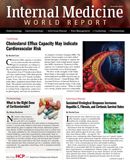Publication
Article
Internal Medicine World Report
Should Doctors Stop Prescribing Daily Aspirin? - A Q&A with Jeffrey Berger, MD
Author(s):
Several studies published in 2014 addressed the risks and benefits of prescribing aspirin to prevent cardiovascular events. In a Q&A with HCPLive's Gale Scott, Jeffrey Berger, MD, takes up the debate.
Several studies published in 2014 addressed the risks and benefits of prescribing aspirin to prevent cardiovascular events. In a Q&A with HCPLive’s Gale Scott, Jeffrey Berger, MD, takes up the debate.
What are you seeing in your practice—do patients tell you they are taking aspirin regularly?
People sometimes forget aspirin is a drug, not a risk-free over the counter supplement. There has been a lot of media attention on the value of taking aspirin, but at the end of the day the data are consistent that aspirin has a significant benefit in decreasing the risk of secondary cardiovascular (CV) events. But it is not risk free - there is a significant risk for side effects.
Can taking aspirin regularly give patients at risk of CV events a false sense of security and keep them from addressing their risky behaviors?
Sure. Unfortunately that is true, but it also true of any potential therapy. People may put too much stock into any therapeutic medication and not enough into making lifestyle changes.
How common is it for patients with atrial fibrillation (AF) to be taking aspirin? A Canadian study (SPRINT-AF: Stroke Prevention and Rhythm Interventions in Atrial Fibrillation) showed that 20% of patients getting oral anticoagulants were also getting antiplatelet drugs, and that 40% of AF patients were taking them without an indication.
That 40% sounds too high to me. But I think it is important to remember that AF is a very serious disease, best controlled with proper anti-coagulation therapy. Anti-platelet therapy works but it is not as effective. Unfortunately many practicing physicians overuse anti-platelet therapy and underuse anti-coagulation therapy, which has little benefit for stroke prevention.
When and why could anti-platelet therapy be risky?
It carries a significant risk of bleeding. It is always a matter of determining the benefit vs. the risk of inhibiting platelet function. Deciding when to use it is not a simple decision, and that should be the subject of a conversation every health-care practitioner should have with every patient.
Has the FDA changed its recommendations on taking aspirin to prevent cardiovascular events?
No, in its statement (in May 2014), the FDA just reiterated what it has said for decades: that there is no FDA recommendation for taking aspirin as a preventive measure in healthy subjects. For everyone to be on aspirin for prevention is too simple; we need to figure out who would benefit (eg, where the benefit outweighs the risk).
Is there general agreement on that, the idea that taking aspirin as though it were a vitamin is not a good idea?
There is some misperception out there. People think, “Oh, aspirin is so simple.” They think that it is not a drug. Not true.
But it does work for certain patients, right?
Yes, and that is not inconsistent with what the FDA is saying. Again, it is the basic art of medicine, deciding where the benefit outweighs the risk.
What about high-risk patients—does aspirin help them? What about the Japanese study presented at the American Heart Association’s meeting in November 2014 that looked at more than 14,000 patients at high risk of CV events and showed no benefit from aspirin?
This study is the 10th large randomized study of this issue where it showed there was no significant benefit toward reducing the primary endpoint of the study. This is why FDA came out and said what it did reiterating that it did not have a recommendation on aspirin as a way to prevent cardiovascular events in generally healthy individuals. The study’s conclusions were not surprising and they get to what I do and believe in my practice and research. It is too simple to just look just at a patient’s age and risk factors and say we should treat them all with aspirin. We don’t do that for hypertension or high cholesterol. We take readings, we measure. But with anti-platelet therapy we don’t measure platelet function. That’s why one of the things we do at NYU is to try to understand a patient’s risk based on platelet function—and nobody’s done that. It’s like doctors see a nail sticking out and decide to hit it with a hammer without deciding which hammer is best for the job.
Might taking aspirin to prevent CV events have a place in primary care in medically underserved areas—countries where patients don’t have much access to cardiologists?
That’s a hypothesis that needs to be tested—I would be very careful there.
Any concluding thoughts you’d like to share with our readers?
It’s important to be clear that aspirin is appropriate in secondary prevention, but not for people without any established disease (primary prevention). Also, there have been some interesting data on the pleiotropic effects of aspirin. It may lower the risk of certain gastro-intestinal cancers. We are learning every day that aspirin has amazing effects; in the future we will know a lot more about the overall benefits and risks of this drug.
Jeffrey Berger, MD, is an assistant professor in the departments of medicine and surgery at NYU Langone Medical Center, and Director of Cardiovascular Thrombosis for the Marc and Ruti Bell Program in Vascular Biology at New York University School of Medicine.






